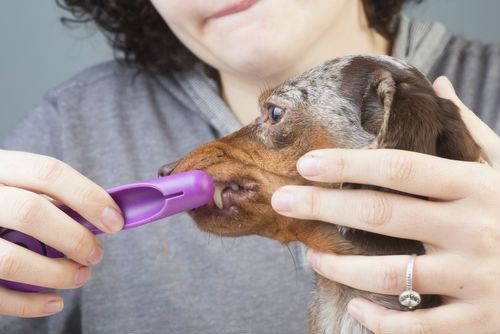
Dental care is an important aspect of your pet’s overall health, and if left unchecked, dental problems can lead to other serious health issues. According to the American Veterinary Dental College, most dogs and cats are experiencing some form of dental disease by age three. Pet owners don’t always recognize the early signs of oral health issues, and dental disease is the number one undetected illness for both dogs and cats. Without effective preventive measures, the disease process will only advance with age. Routine pet dental care—both at home and in-clinic—can help your pet live a long and healthy life.
Home Care
Ideally, dental wellness begins at puppyhood and kittenhood, when it’s easy to get in the habit of routine preventative care. Puppies and kittens are usually very willing to let you rub their teeth with gauze, and later introduce a finger brush or small toothbrush and enzymatic toothpaste.
In addition to regular brushing, our clinic offers a variety of dental care products to help you maintain your pet’s oral health at home. OraVet Dental Hygiene Chews clean teeth and block bacteria to help prevent plaque, calculus (tartar), and bad breath. Dental treats can help reduce plaque and tartar formation while your pet chews, and water additives are products you can add to your pet’s drinking water to freshen your pet’s breath and prevent plaque accumulation. Oral rinses, gels, and sprays all contain active ingredients that help fight plaque and bacteria.
On a monthly basis, examine your pet’s teeth for accumulation of material where the tooth meets the gum line. If you notice visible plaque or tartar accumulation, it’s time for a professional cleaning.
Professional Cleaning
Regular veterinary wellness exams (annually for most pets, and semi-annually for senior pets) are essential to check the status of your pet’s teeth and mouth. Your veterinarian can help you create a custom care plan that includes routine dental cleanings – how often your pet will need professional cleaning is based on diet, at-home care, and genetics. Keep in mind that routine preventatives are not substitutes for thorough dental cleanings. Even when teeth look visibly clean, there can be dental disease below the gum line.
At Sierra, all professional dental cleanings are done under anesthesia to remove bacteria from below the gum line, remove visible tartar and plaque build-up, and polish the surfaces of the teeth. Current anesthetic protocols are very safe for pets, and all Sierra dental procedures are done with intravenous fluid support for your pet’s safety. Prior to any dental procedure, your veterinarian will first perform a detailed physical evaluation with blood work, just like in people.
Possible Warning Signs
In many cases, pets do not show any visible signs of dental disease, which is why regular veterinary wellness exams are so important. If your pet is refusing to eat, pawing at the mouth, frequently sneezing, or experiencing swelling below an eye, something may be wrong in their mouth. Other possible signs of dental disease in dogs and cats include bad breath, broken or missing teeth, discolored teeth, excessive drooling, reduced grooming, disturbances in sleep pattern, a mass or lump in the mouth, bleeding from the mouth, and pain when opening or closing the mouth. If your cat or dog is displaying any of these symptoms, be sure to call the clinic immediately to schedule a complete wellness exam.


